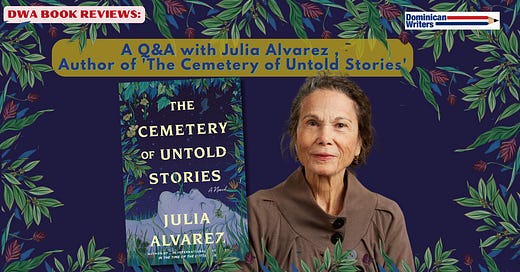The idea to bury the story-filled boxes arrives in her sleep. Alma Cruz, the writer at the heart of Julia Alvarez’s forthcoming novel, The Cemetery of Untold Stories, dreams of her friend – a fellow novelist so possessed by an unfinished project that it seemingly killed her.
Alma vows that she wouldn’t let the same thing happen to her. Then the ground beneath her shifts after her father dies, orphaning her and her three sisters. He left behind a dozen or so parcels of real estate in the Dominican Republic. Alma chooses the worst lot – a small plot of land in a barrio, near a dump.
It is in this parcela that Alma embarks on a new project: to bury her unfinished manuscripts and short stories. “The boxes of unfinished novels and stories are stacked in discrete piles covered with plastic tarps throughout the cemetery,” Alvarez writes. “Alma’s original idea was to bury them intact, but she decides to burn them instead. More final that way: a period, not an iffy ellipsis, at the end of her writing career.”
Alma hires a local woman named Filomena to watch over the graveyard. The novelist hopes that, in burying her stories, they will finally rest. But that’s the furthest from the truth. The characters’ voices instead break ground and begin to share bits of their life with Filomena. They include Bienvenida, the second wife of dictator Rafael Trujillo, and Alma’s own father – Dr. Manuel Cruz. Their stories launch a spellbinding, unforgettable ride for readers. In The Cemetery of Untold Stories, Alvarez deftly weaves magical realism, pieces of forgotten history, and existential questions many writers face. This multi-layered, rich novel about storytelling and the stories we tell ourselves to cope with life’s many struggles is a feat the acclaimed Alvarez has rightfully mastered.
Ahead of her book’s release, Alvarez spoke with the Dominican Writers Association about the inspiration behind The Cemetery of Untold Stories, how she was forced to approach this novel differently, and more.








Share this post